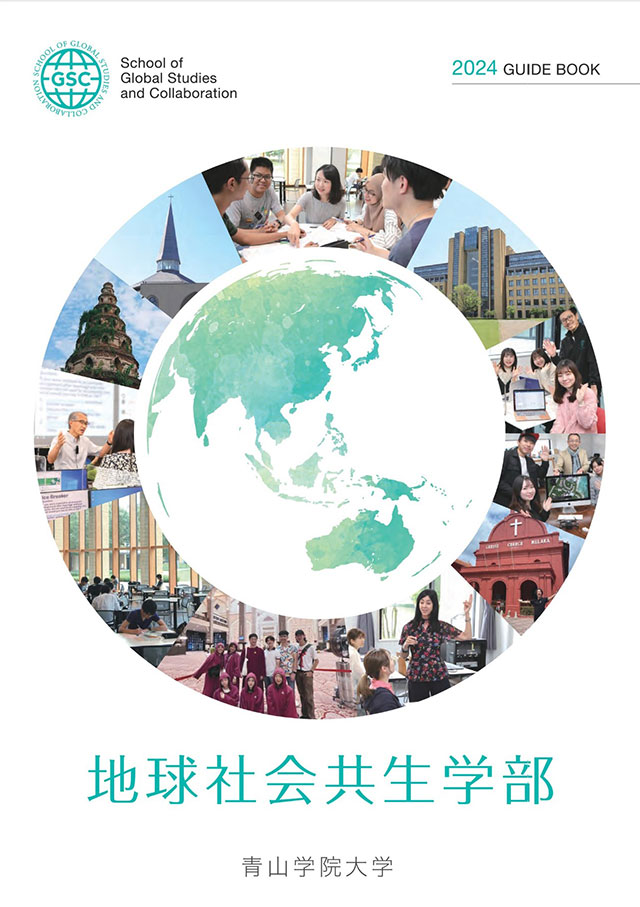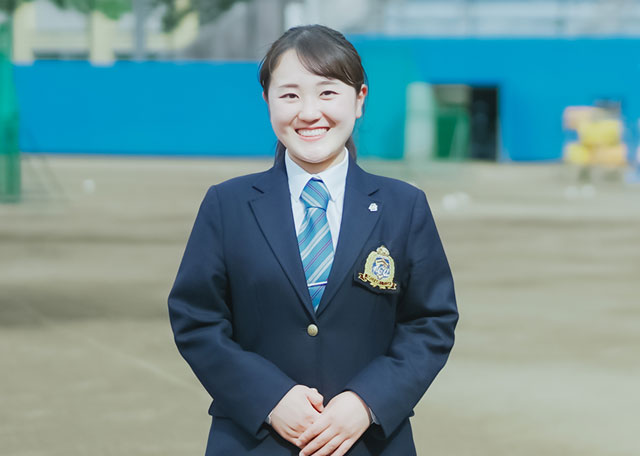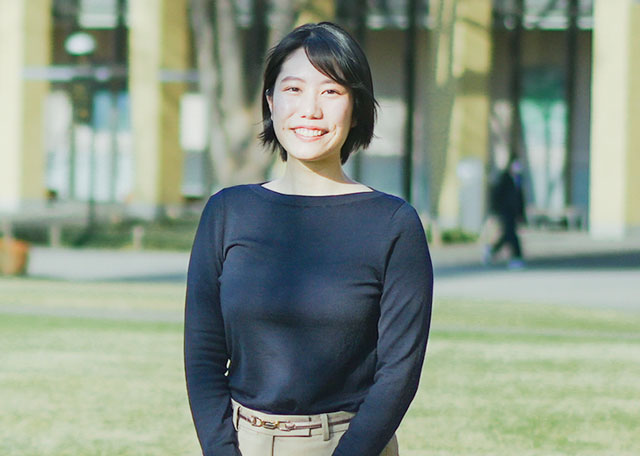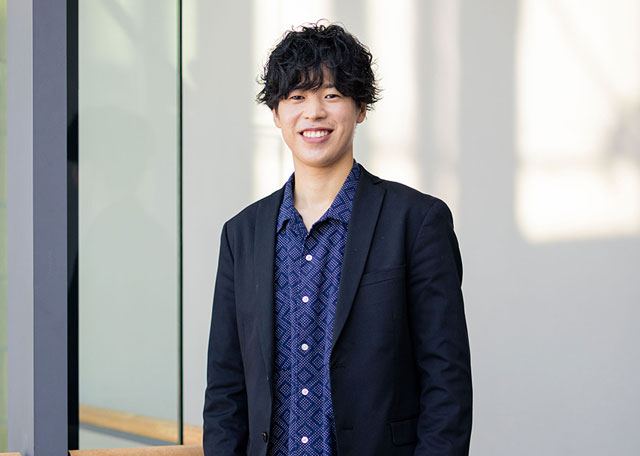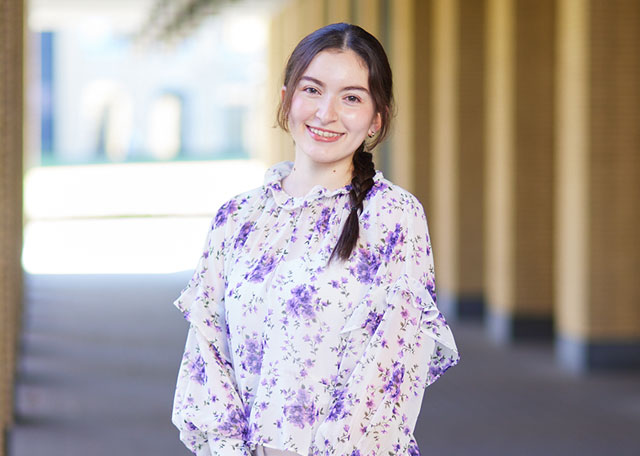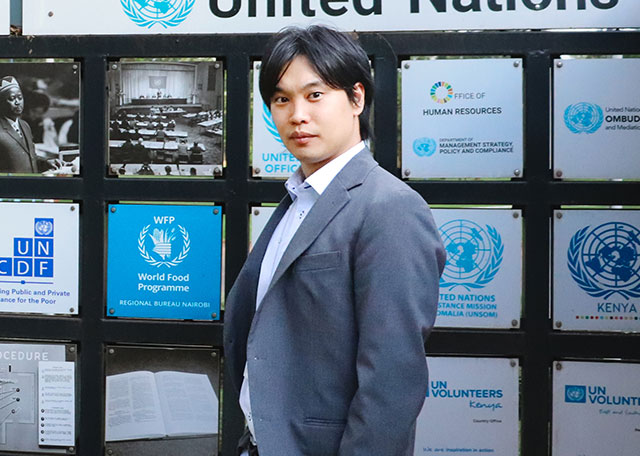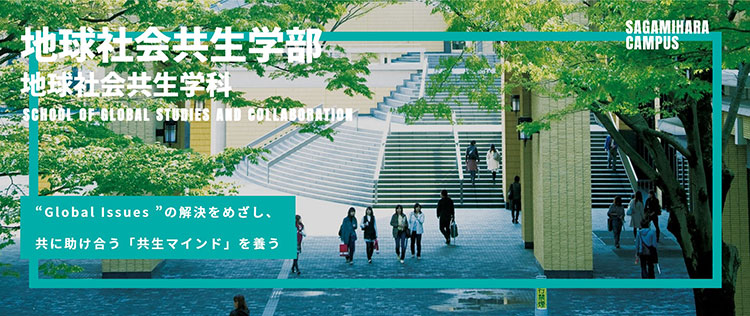Students and teachers collaborate
Growing together,
Addressing global challenges
The future is unpredictable, "VUCA" * Now, in what is called the "era,"
What kind of talent should School of Global Studies and Collaboration cultivate?
Global and unique in their own style
Two teachers with professional experience will talk to each other.
*VUCA is an acronym derived from the first letters of V (Volatility), U (Uncertainty), C (Complexity), and A (Ambiguity), and refers to a situation in which it is difficult to predict the future and the outlook is unclear.

Eric Masashi Matsunaga, General Manager
Graduated from the Master's course Graduate School of International Politics, Economics and Communication Aoyama Gakuin University Graduate School. Using his experience as a musician, he is active as a business consultant leading the digital age. After working as an executive officer at Accenture, IBM Japan, and Deloitte Tohmatsu Consulting, he has held his current position since 2023.

Professor Masanobu Horie
Graduated from the Graduate School of International Social Development at Nihon Fukushi University, and completed the Doctoral Program in Global Society at the Graduate School of Social Sciences at Waseda University. After working at the Tokyo headquarters of Obayashi Corporation and being stationed in Bangkok, he worked as an employee of the United Nations World Food Programme in Indonesia and Sudan, and has been in his current position since 2022.
 Thorough English education and undergraduate study abroad,
Thorough English education and undergraduate study abroad,
The appeal of GSC is the broader range of learning it offers
Eric: The School of Global Studies and Collaboration and Collaboration (GSC) aims to foster a "coexistence mindset" to face global social issues. In line with Aoyama 's school motto, "Salt of the Earth, Light of the World," in other words, it is a school that is typical of Aogaku in the sense that it cultivates a spirit of contributing to society. Academic faculty members who explore specialized fields and faculty members with professional work experience in companies and other fields work together to constantly evolve in line with social conditions and work on new "global studies."
Horie: Traditionally, the spotlight has been on the United Nations and JICA in terms of how global issues are addressed, but going forward, we will need to combine the power of various fields, such as the business world, the media, and NGOs, to address these issues, and international cooperation experts are considering collaborating with companies. I think that one of the great features of GSC is that you can learn a wide range of things, including new ways of thinking, from a diverse faculty. Both students and faculty have a lot to do, so it's very busy in a positive sense, but I feel that it's all the more rewarding.
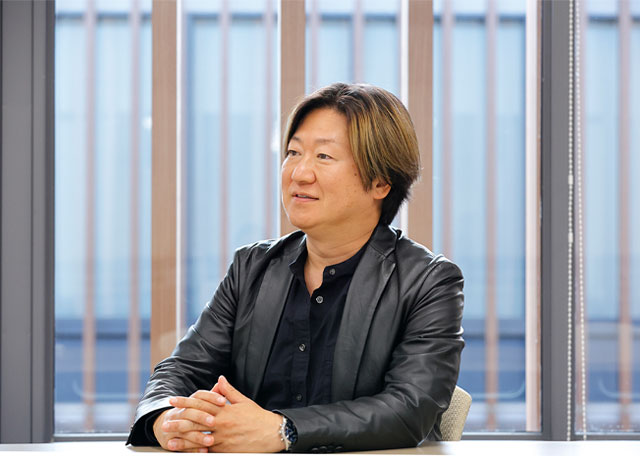 Eric Masashi Matsunaga, General Manager
Eric Masashi Matsunaga, General Manager
Eric: One of the features is that you can learn in stages. You gain knowledge through classroom lectures, and then experience learning through undergraduate study abroad in Thailand and Malaysia. Then, there are seminars to summarize your experience abroad and learn more about your field of interest. In addition, we have a curriculum in which students learn English from native speakers in six classes a week from the first year as a tool to gain diverse experiences while studying abroad. We limit the study abroad destinations to partner universities in Thailand and Malaysia, because of the significance of studying in Asia, where social change is rapid, and the purpose of students learning in common. However, we hope that this study abroad in Asia will be an opportunity to learn around the world. In fact, some students go on to study abroad in Europe and the United States afterwards.
Horie: Looking at GSC students, I feel that if they are exposed to English on a daily basis, English will no longer be a barrier, and they will be able to communicate their thoughts to others, understand what others are trying to say, and grow to a level where they can collaborate in English. Also, if you are involved in international business in a company, you will often be involved with people from Asian countries, so experience studying abroad in Asia should be an advantage. I was stationed in Thailand in my previous job, and to be honest, I was a bit confused at first because I was not very familiar with the local area. I think students also have some anxiety before studying abroad, but when they return from studying abroad, I can see that their attitude has changed completely.
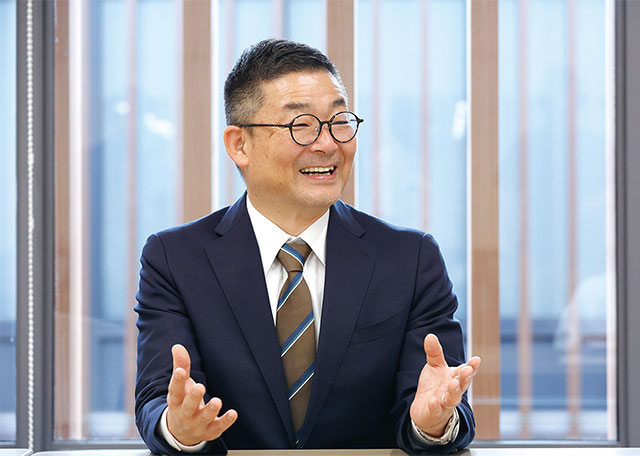 Professor Masanobu Horie
Professor Masanobu Horie
 Learning from fellow teachers and students of different generations
Learning from fellow teachers and students of different generations
I am also growing through the stimulation
Eric: Professor Horie is fluent in Thai and other Southeast Asian languages, and when I accompanied him on a tour of Thailand, I was surprised at the depth of communication he had with the local people, as he was laughing out loud in casual conversation. When we focused on the "coexistence mindset," I was reminded of the significance and importance of communicating in the local language.
Horie: I was transferred to Thailand shortly after I started working, so I don't have a family and I don't play golf. Maybe it was unusual to see a Japanese person like me, but the locals took me to various places. Thanks to that, I made more Thai friends, learned Thai, and was able to experience the local culture by going shopping and experiencing various things together. I hope that students will also have many experiences during their undergraduate study abroad. I hope that students will learn about local culture in class, see and hear things for themselves while studying abroad, and feel various things, such as "So that's what the teacher was talking about" or "That's not quite right, it looks like this to me."
Eric: Thanks to Professor Horie, I have become more interested in Southeast Asia. In Malaysia, I saw the vast palm fields that produce palm oil, which is used in many of our daily necessities, and my awareness of environmental issues has increased.
Horie: I also learn a lot from professors in various fields and use what I learn in my own field. I have started a new initiative with my students to see if we can approach environmental issues and local labor issues related to palm oil from a business perspective, which is Professor Eric's specialty.
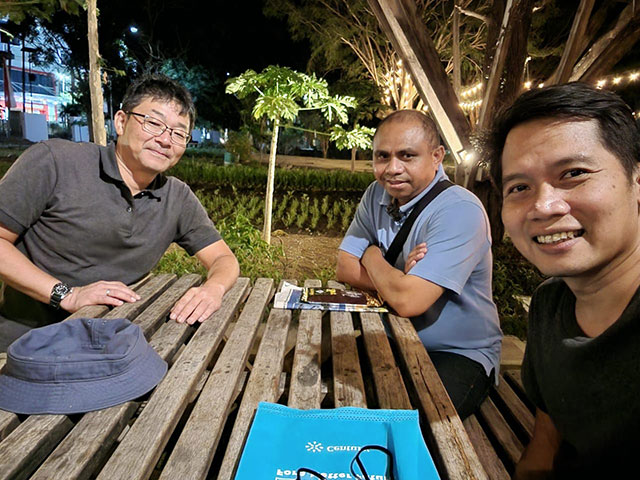 Professor Horie and his Indonesian collaborators
Professor Horie and his Indonesian collaborators
Eric: There are many things to learn from being influenced by people of different fields and generations. My policy is to grow together and "co-educate," and I learn a lot from students. In this day and age when information is important, I learn a lot from how to use media, especially SNS, and compared to us who didn't have cell phones when we were students, they are very sensitive to IT and digital technology, which is very stimulating. As the saying goes, "From things to experiences," consumption behavior is different from our generation. When I was young, the cars I wanted more than anything were shared, and experiences are more important than things. I am also impressed by the fact that many students are interested in contributing to society and have volunteer experience.
Horie: With regard to aid for Ukraine, Japan is providing necessary supplies for daily life, but some countries are also providing weapons. As a humanitarian aid specialist, I think that humanitarian aid and weapons are contradictory, but a student asked me if they actually have the same effect, which made me realize that there is another way of looking at it. I always keep in mind what my mentor told me: "A scholar is not one who teaches, but one who learns." I may have more knowledge in textbooks than my students, but I often learn a lot from interacting with them.
Eric: When I interact with students, I try to be "empathetic." In short, it's not a teacher-student relationship, it's collaboration. When we share our knowledge in an equal conversation, we realize and learn. For example, I know about the development of Sony, the company that made the Walkman, but by sharing our mutual image of Sony with today's students who don't know about that era, we make new discoveries.
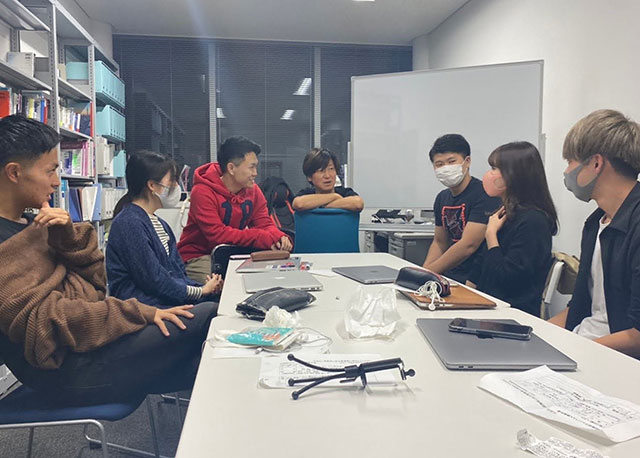 Professor Eric talking to students
Professor Eric talking to students
 Mastering the "Coexistence Mindset" for People's Happiness
Mastering the "Coexistence Mindset" for People's Happiness
I want them to become active global citizens.
Eric: Empathy is also necessary in business, and when working globally and in collaboration with people from various fields, a team cannot function without empathy. When people from various countries in the Asia-Pacific region gathered, we held a session to talk about the negative images they had of each other, and as they talked and got to know each other, they realized that "this image is only between countries," and felt that if they could talk openly at an individual level, they could empathize across countries.
Horie: Before I was posted to Thailand, I thought that all Thai people liked coriander, but in fact, many people disliked it. We are often stuck in stereotypical ways of looking at things. Also, since I work with people from all over the world at the UN, I was concerned about communication, but I realized that we can coexist by having a common goal, for example, how to provide food to areas with food shortages. When I was posted to Thailand, people around me told me, "When in Rome, do as the Romans do." This means understanding the differences between you and the other person and acting in accordance with the other person's culture and customs, but I think that we are now in an era where we need to go a step further and coexist while respecting each other.
Eric: The issue I'm most interested in is diversity. There was no distinction between men and women in the music world where I was originally from, but when I entered a company, I found that it was rare for women to hold important Position, and I felt uncomfortable with the situation where women had to quit when they got married or had children. Later, when I worked for an American company, my boss was a woman, and there was also a company with a female president, which made me think about the differences with Japan. I've seen friends who have had sad experiences because of gender, so I want to create a society where everyone can coexist with smiles, and I think it's an issue that GSC should actively address.
Horie: Global issues are addressed by organizations based on national frameworks, such as the United Nations and the WHO. The COVID-19 pandemic has clearly shown that there are limitations to this alone when facing borderless issues. We need to create more global units, and for that we need a "coexistence mindset." For those of you who are still unsure of what you want to do, I hope you will find out what kind of problem-solving you can contribute to at GSC, where you can learn a wide range of things.
Eric: Recently, even in Japan, the need for companies to face social issues has been questioned, but in the United States, there have been companies that have long presented the idea that companies should not only pursue profits, but also contribute to society. I would like GSC graduates to engage in activities that will make this way of thinking the standard in Japan. This applies not only to those who go on to work for companies, but also to artists and others. For example, I would like them to engage in activities that are conscious of the happiness of others, such as creating works using recycled materials, rather than just for the sake of self-expression. To all the students who are thinking of doing something to help others in the future, let's grow together at GSC.
Interview School of Global Studies and Collaboration (AGU LiFE)
*The years of employment, Position, activities, etc. of the people featured are, in principle, those at the time of the interview, unless otherwise noted.
